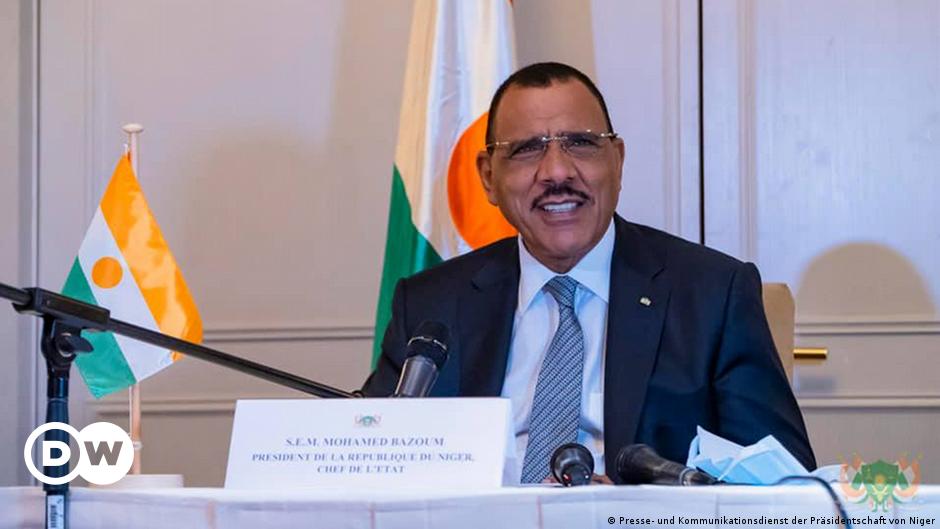
Mohamed Bazoum was sworn in as president in April in Niger’s first democratic transfer of power. He now leads the country ranked as the world’s poorest on the UN’s 2020 Human Development Index. Niger also is being ravaged by violence from Islamic extremists and armed groups active in the border regions with Mali and Burkina Faso. While in Germany to meet with Chancellor Angela Merkel, President Bazoum talked to DW about how he plans to combat Islamist violence.
DW: France has said it will reduce its troop numbers in the Sahel. Do you expect Germany to do the same?
President Mohamed Bazoum: No, that’s not the issue. You see France is reducing the number of its soldiers because they are totally unnecessary.
We don’t need soldiers on the ground fighting counterterrorism military operations. We need our European partners for things we can’t do. In concrete terms, we need equipment like reconnaissance aircraft and other detection technology that we don’t have. It’s important for our information and intelligence agencies.
The Europeans have this and we don’t! For example, we don’t have any significant air capabilities to assist soldiers during ground operations. Our French and German partners could help us bridge this gap in the fight against terror. We really need a type of special forces that can use these technologies that we don’t have. That way we could complement each other. Fighting on the ground is our business, not our partners.
Niger’s President Mohamed Bazoum met Germany’s chancellor Angela Merkel in Berlin
So you would like to continue the military campaign against the Islamists? Shouldn’t the fight against terror rather be strengthened through development and improved social cohesion?
Currently, we are fighting terrorists where they have taken control of areas, where they use violence to oppress the population and extend their control even further. The terrorists collect taxes from the people. They have banned and closed schools. Health centers can’t operate. Public administration in terrorist-held areas isn’t functioning either. This is our priority right now. But beyond that, of course, is the question of development. We have to promote that in our state, so that young people aren’t encouraged to become bandits to make a living.
First, though, we urgently need to fight the terrorists, destroy them, reduce their numbers. Of course, there is the fundamental question of development — but we mustn’t confuse the two.
But shouldn’t both be done simultaneously: counterterrorism and development?
Yes, we should tackle both. What the EU, France and Germany do is important! But we need to conduct military operations, and it’s not as if we only need development. In any case, I’m not sure our partners can provide more to our countries [in the Sahel] than they already do in terms of development cooperation. But right now, we must fight terrorism on a military level.
Niger’s President Bazoum gives an exclusive interview to DW
Leaders in Mali have recommended holding a dialogue with the jihadists. Would that be an option for Niger?
The situation in Niger is different to that of Mali. We don’t have Nigerien jihadists heading up a terrorist movement who send us complaints or demands. … So, it’s not that we can suddenly say that we want or don’t want dialogue. If we had a partner for that or someone made them themselves available, then we could think about it.
So in your eyes, the option of dialogue won’t arise?
No, it does not arise. Because we are primarily affected by the action of the Islamic State in the Greater Sahara [ISGS] and the [al-Qaeda offshoot] Group for the Support of Islam and Muslims [GSIM]. The heads of these two organizations are not Nigeriens.
GSIM — they are Malians. And in ISGS, it’s a Sahrawi [people from the Western Sahara]. So, we don’t have a head of a Nigerien terrorist unit who has made demands on Niger, and therefore Niger has no partner for talks with the jihadists. It doesn’t make sense for us to say we want dialogue, or we don’t want dialogue.
You say there are no Nigerien terror chiefs. But there are many Nigeriens joining these groups. How do you plan to stop that happening?
We are developing concrete actions to educate people. Unfortunately, I can’t go public about what exactly we are doing. We know these young Nigeriens joining terrorist groups are not doing so out of an ideological conviction or radical Islamic conviction. Rather, it’s more that they join because they believe they will find something to eat and to survive. Sometimes some of the young people who chose this venture actually make some money. That, in turn, has led others to copy them.
President Bazoum visits troops in Diffa, Niger
Basically, much of Africa’s future terrorism is limited to that. There are some leaders with ideological convictions but they aren’t really motivated by these convictions. To be honest, it’s created a creim-based business that benefits its leaders but also its ordinary soldiers. That’s the heart of what we are seeing in Niger! We need to fight this dynamic among young people.
You were Minister of the Interior and Public Security for four years. What did you fail to do during that time that has resulted in the Niger of today: massacres, attacks that result in more than 200 dead…?
The situation has become worse, especially in Mali, unfortunately. Terror groups have expanded their bases there. And more young people are joining the movement.
And the intelligence technologies you mentioned. Would they help identify attackers coming into villages on motorcycles, for example?
If we had radar, if we had Intelligent support systems, if we had helicopters, our approach would have been completely different.
Do you sometimes suffer sleepless nights because of the terror? After all, behind the sheer number of victims of the massacres are human beings, families, relatives who are suffering.
If you [in Germany] are shocked when you hear that countless people are dying, then you can certainly imagine what it must be like for someone like me: the head of the state. Someone who is expected to deal with such situations, to prevent them and to make sure they don’t happen again. It’s even more difficult!
This interview was originally conducted into French. It has been translated into English by Cai Nebe.








